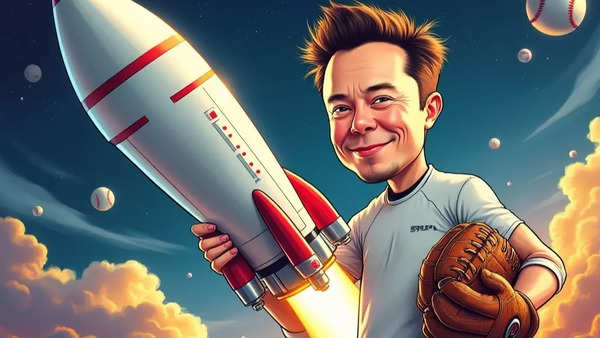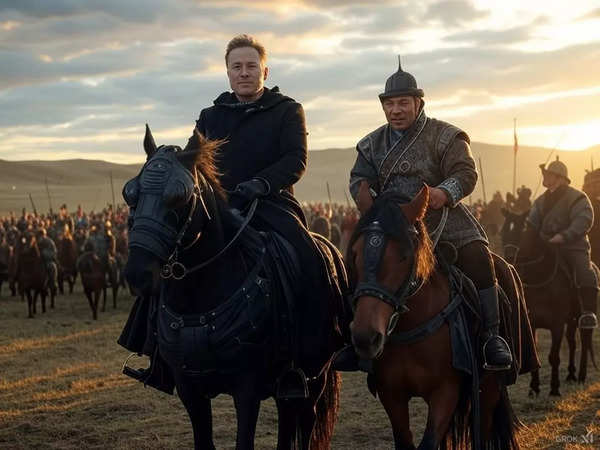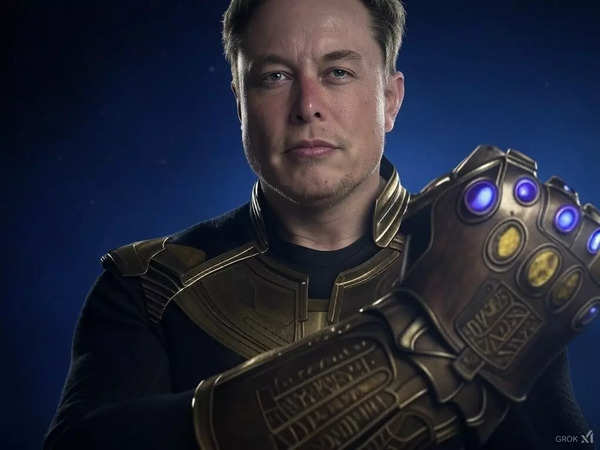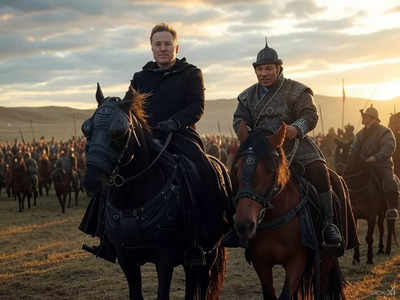Amid rumors that he has birthed a 13th child, Elon Musk tweeted that he finds the history of Genghis Khan “particularly interesting.” Now, that’s not surprising at all, given the fact that Elon Musk and Genghis Khan are practically the same people—warlords hellbent on spreading their seed, conquering new lands, destroying the status quo, annihilating their opponents, and reducing carbon footprints on a global scale.
While Musk has so far fathered 13 children (if rumours are to be believed), Genghis Khan is estimated to have fathered thousands, with modern genetic studies suggesting that roughly 16 million men today carry his Y-chromosome. By comparison, Musk—who has often spoken about his mission to combat declining birth rates—seems to be operating at a more modest scale.
At first glance, Musk and Genghis Khan couldn’t be more different. One was a warlord who united the Mongol tribes through brutal conquest, while the other builds electric cars, sends rockets to space, and manipulates stock markets with a tweet. But dig a little deeper, and the parallels are uncanny.
Empire Builders: One Conquered Land, the Other Conquers Industries

Genghis Khan didn’t just win battles—he reshaped entire civilizations. The Mongol Empire, at its peak, spanned 9.27 million square miles, making it the largest contiguous land empire in history. He crushed old systems, destroyed cities that resisted, and rewrote the rules of warfare and governance.
Musk, too, is an empire builder—not with swords, but with technology and aggressive business tactics. He disrupted the automotive industry with Tesla, taking on legacy giants like General Motors and Toyota. With SpaceX, he forced NASA and Boeing to play catch-up, making space travel not only cool again but commercially viable. With X (formerly Twitter), he turned an already chaotic social media landscape into an unfiltered war zone of free speech absolutism. Neuralink and xAI? More territories on the map of Musk’s ever-expanding dominion.
If the 13th-century world was a chessboard of rival warlords, Musk’s is a marketplace of outdated industries, ripe for disruption and conquest.
Fearless Expansionists

Genghis Khan didn’t play defense. His strategy was simple—attack, expand, dominate. The Mongols moved at lightning speed, taking city after city, crushing their enemies, and absorbing the best talent into their empire.
Musk operates the same way. Tesla didn’t just make electric cars—it waged war on the entire auto industry. SpaceX didn’t just launch rockets—it rewrote the space race. Musk’s companies don’t enter markets; they storm the gates. Tesla’s aggressive pricing strategies forced legacy automakers to shift toward EVs at breakneck speed. SpaceX’s reusable rockets made traditional aerospace contracts look like relics of a bygone era.
And then there’s X. When Musk bought Twitter, he didn’t just take over a company—he declared war on the entire media establishment, journalists, and traditional social norms around content moderation. He slashed staff, upended the business model, and turned the platform into his own digital fiefdom.
Like Khan’s blitzkrieg across Eurasia, Musk’s expansion is relentless, unorthodox, and utterly ruthless.
Destroyers of the Status Quo: Out with the Old, In with the Chaos
Genghis Khan wasn’t just a conqueror—he was a disruptor. His armies dismantled centuries-old feudal systems, shattered powerful kingdoms, and redrew the map of the known world. The Mongols introduced new governance models, promoted trade routes (like the Silk Road), and even established an early postal system. But before innovation came destruction. Entire cities were razed. Dynasties were obliterated. The old world had to die for the new one to rise.
Musk follows the same philosophy. When he takes over an industry, he doesn’t just compete—he destroys the old order. Traditional automakers laughed at Tesla until they found themselves scrambling to go electric. NASA underestimated SpaceX until its own programs looked archaic. And Twitter? The moment Musk took over, he fired nearly 80% of its staff, tore up content moderation policies, and rebranded it as “X,” discarding years of accumulated brand equity.
Just as Khan rewrote the rules of war, Musk rewrites the rules of business and media. Both leave destruction in their wake—though one with swords, the other with spreadsheets and tweets.
Followers Across the Globe: Armies of Soldiers vs. Armies of Fanboys

Khan commanded one of the most disciplined, effective military forces in history. His soldiers were fiercely loyal, adopting the Mongol way of war and governance. His empire, at its height, ruled over more than 100 million people, from China to Eastern Europe.
Musk? He commands a different kind of army—tech investors, engineers, and die-hard fanboys. He has millions of followers who hang onto his every tweet, push Tesla stock to astronomical heights, and defend him against any and all criticism. Musk’s followers aren’t just customers; they’re disciples.
Khan’s warriors rode on horseback. Musk’s army fights online, flooding social media with memes, arguing with skeptics, and buying Tesla stock like it’s a ticket to Valhalla.
Unusual Naming Habits: From Warriors to Equations
Khan named his sons after great warriors. Musk? He takes a slightly more… futuristic approach. His children’s names sound like they were generated by an AI glitch.
Genghis Khan’s sons: Jochi, Chagatai, Ogedei, Tolui—strong, powerful names of warriors.
Elon Musk’s children: X Æ A-12, Exa Dark Sideræl, Techno Mechanicus—strong, powerful names of… math equations?
Khan’s names carried the weight of history. Musk’s sound like he’s future-proofing them for a dystopian cyberpunk world. Either way, both leaders ensure their bloodline is marked by distinct, unforgettable names.
Environmentalists: Yes, Really
Like Thanos, Musk is famously obsessed with reducing carbon footprints. Tesla’s mission is to accelerate the world’s transition to sustainable energy. His solar and battery companies aim to make fossil fuels obsolete. Even SpaceX’s long-term goal—colonizing Mars—is framed as a way to secure humanity’s survival.
But here’s the wild twist—Genghis Khan was, in a way, also an environmentalist. His conquests wiped out an estimated 40 million people, and in the process, vast farmlands were abandoned, forests regrew, and global carbon levels dropped. Some researchers argue that the Mongol invasions effectively acted as a carbon sink.
Musk reduces emissions through electric cars. Khan did it through sheer annihilation. The methods couldn’t be more different, but the outcome—lowering humanity’s footprint—is oddly similar.
The 13th Child: Musk’s Personal Khan Moment?
The timing couldn’t be more intriguing. Just as speculation swirls that Musk has fathered a 13th child—this time with conservative influencer Ashley St. Clair—his sudden interest in history’s most infamous conqueror raises eyebrows.
If the rumours are true, Musk’s growing dynasty mirrors Khan’s legendary genetic legacy. He’s often spoken about the dangers of declining birth rates, and unlike most billionaires who simply tweet their opinions, Musk actively contributes to the solution.
Yet, unlike Khan, whose children were openly acknowledged, Musk’s latest offspring remains shrouded in mystery. No public records. No official confirmation. Just whispers and a cryptic “Whoa” from Musk himself.
What’s Next? The Legend Grows
Elon Musk isn’t slowing down—neither in business nor in family planning. Whether he’s launching rockets or raising heirs, his approach remains the same: aggressive, unconventional, and utterly relentless.
Genghis Khan reshaped the world through conquest. Musk is doing it through technology. Both men built empires. Both disrupted the status quo. Both were, and are, unstoppable forces in their respective eras.
And if Musk’s fascination with Genghis Khan is any indicator, he’s only just getting started.







